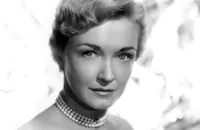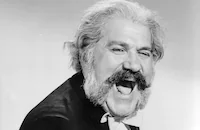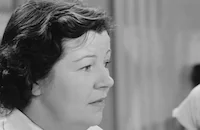Fast Company

Brief Synopsis
Cast & Crew
John Sturges
Howard Keel
Polly Bergen
Marjorie Main
Nina Foch
Robert Burton
Film Details
Technical Specs

Synopsis
After race horse Gay Fleet comes in last for the fourth time in a row, trainer Rick Grayton and jockey Manuel Morales discuss Rick's plan to keep the horse from winning so that he can buy it from its owner, New York actress Carol Maldon, for far less than it is worth. When Rick and Manny reach the next town on the gypsy racing circuit, they are surprised to find that Carol is a guest at their hotel. Carol, a racing novice, explains that she has come to take charge of the "stable" she inherited from her father, unaware that it consists of only one horse. Rick takes Carol to Ma Parkson's farm, where Gay Fleet is boarded, and they meet the glamorous Mercedes Bellway, who is immediately attracted to Rick. That night, Rick plies Carol with wine, reminisces about his long friendship with her late father and offers to buy Gay Fleet for $500. After sending the tipsy Carol to bed, Rick joins Mercedes in the hotel bar and is delighted to learn that she is from a wealthy family that owns a chain of stables. Meanwhile, Dave Sanderling and "Two-Pair" Butford, who overheard Carol talking about Rick's offer while playing cards in the hotel lobby, go to her room and offer her $1,000 for her horse. Dave tells Carol that Rick never even knew her late father until six months ago, and she storms into the bar and berates Rick. The next morning, Dave and Two-Pair go to the track and watch as Manny spurs Gay Fleet to great speeds by singing in its ear. After clocking the horse's impressive time, they realize that Rick has been deliberately holding it back. Dave raises his offer, but Carol decides to keep the horse and engages the crooked Two-Pair as her new trainer. Two-Pair steals Carol's feed to pay his gambling debts and, under Dave's guidance, mistreats Gay Fleet to make the horse run poorly. Carol stubbornly continues to race Gay Fleet, and when the horse consistently comes in last, she grows suspicious. One day, Dave urges Carol to use her dwindling resources to buy another horse in a claiming race, and she decides to claim Rick's horse, Countess Jay, hoping to drive him out of business. Countess Jay collapses and dies after crossing the finish line, however, and Carol is dismayed to learn that she must pay for the dead animal. With her money almost gone, Carol offers to sell Gay Fleet to Dave, but he offers her only a paltry sum. Carol goes to see Rick, who is now romantically involved with Mercedes, and he tells Carol that Dave and Two-Pair cheated her. When Carol confronts Two-Pair, he strikes her, after which Rick beats him up, then proposes a partnership with Carol. As they work to prepare Gay Fleet for the big race, Rick and Carol eventually acknowledge their feelings for each other and kiss. The day before the race, Ma's daughter "Jigger" falls off a horse and breaks her leg, leaving Ma with an enormous hospital bill. Rick asks Mercedes for the money, and she agrees provided that Rick come to work for her as her trainer. Rick realizes he will be a kept man if he goes with Mercedes, but after fighting with Carol, he consents to the arrangement. Carol angrily prepares to return to New York, but when she stops at the hospital to say goodbye to Ma and Jigger, she is surprised to learn that Rick paid their bill with the money he received from Mercedes. Ma and Carol then inform Manny that Carol will place a large bet on Gay Fleet, and the jockey promises the horse will win. Before the race, Rick instructs Manny not to let Gay Fleet win, as he does not want Carol to leave town, but Manny cannot resist, and begins singing to the horse in the final lap. Gay Fleet wins, narrowly beating Dave's horse. Later, Rick prepares to leave town with Mercedes, only to learn that Carol and Ma have already paid off his debt to her. Rick joins Carol, and they decide to marry.

Director

John Sturges
Cast

Howard Keel

Polly Bergen

Marjorie Main

Nina Foch

Robert Burton
Carol Nugent
Joaquin Garay
Horace Mcmahon
Iron Eyes Cody
Joe Hernandez
Benny Burt
Jesse Kirkpatrick

Jack Kruschen
Paul Brinegar
Pat Goldin
Ralph Littlefield
Jack Daly
Jim Hayward
Donald Kerr
Jack Trent
Billy Dix
Orie Robertson
John Mckee
Perry Sheehan
Robert Board

Margaret Bert
Wilson Wood
Jonathan Cott
John Rosser
Crew
Henry Berman
Eustace Cockrell
Alberto Colombo
Joseph Dervin
Bill Dorfman
Joe Edmondson
John Faure
Cedric Gibbons
A. Arnold Gillespie
Ralph Hurst
Al Jennings
Harold Lipstein
Don Mankiewicz
Warren Newcombe
William Roberts
Johnny Schmitz
Douglas Shearer
Leonid Vasian
Ferris Webster
Al Westen
Edwin B. Willis

Film Details
Technical Specs

Articles
Fast Company (1953)
Although Sturges offered Bergen her best opportunity at MGM in Fast Company, the film marked the end of her brief career at the studio. Disillusioned with her lack of musical and dramatic opportunities in films, Bergen asked to be released from her contract and turned to television. There she gained prominence through her own musical-variety show and a sultry, Emmy-winning performance in The Helen Morgan Story (1957). She returned to movies in the 1960s, playing in both drama (Cape Fear, 1962) and comedy (Kisses for My President, 1964). But the film-musical career for which she seemed eminently qualified somehow never happened.
Director: John Sturges
Producer: Henry Berman
Screenplay: Don Mankiewicz, William Roberts, from story by Eustace Cockrell
Art Direction: Cedric Gibbons, Leonid Vasian
Cinematography: Harold Lipstein
Editor: Joseph Dervin
Musical Direction/Supervision: Alberto Colombo
Principal Cast: Howard Keel (Rick Grayton), Polly Bergen (Carol Maldon), Marjorie Main (Ma Parkson), Nina Foch (Mercedes Bellway), Robert Burton (David Sandring), Iron Eyes Cody (Ben Iron Mountain)
BW-68m.
by Roger Fristoe

Fast Company (1953)
TCM Remembers Howard Keel this Monday, Nov. 15th
PLEASE NOTE SCHEDULE CHANGE
6:00 AM
Callaway Went Thataway (1951)
7:30 AM
Ride, Vaquero! (1953)
9:30 AM
War Wagon (1967)
11:30 AM
"MGM Parade Show #14"
(Keel talks with George Murphy about his latest MGM picture "Kismet")(1955)
12:00 PM
Showboat (1951)
2:00 PM
Kiss Me Kate (1953)
4:00 PM
Seven Brides for Seven Brothers (1954)
6:00 PM
Kismet (1955)
HOWARD KEEL (1919-2004):
Howard Keel, the strapping singer and actor whose glorious baritone took him to stardom in the early '50s in some of MGM's best musicals, including Showboat, Kiss Me Kate and Seven Brides for Seven Brothers, died on November 7 of colon cancer at his home in Palm Desert, California. He was 85.
He was born Harry Clifford Leek on April 13, 1919, in Gillespie, Illinois. His father, was a coal miner and his mother, a strict Methodist, forbid the children from enjoying popular entertainments. When his dad died, his mother relocated the family to California when Harry was still a young teenager.
After he graduated high school, Keel had a brief stint as a singing busboy, but had not considered a professional career as a vocalist....until one fateful evening in 1939. It was at this time he saw celebrated opera singer, Lawrence Tibbett, at the Hollywood Bowl. Keel was inspired, and he soon began taking voice lessons. Over the next several years, he carefully trained his voice while entering any singing contest he could find. It wasn't long before his talents caught the attention of Rodgers & Hammerstein.
In 1946, they signed him to replace John Raitt in the Broadway production of Carousel, changed his name to Howard Keel (His proper surname Leek spelled backwards), and Keel was on his way to international stardom.
After his run in Carousel ended, he sailed to London the following year to play the role of Curley in Rodgers & Hammerstein's Oklahoma. He received rave reviews from the London press, and by the time he returned to the United States in 1948, he was ready to make his move into films.
Keel made his movie debut in the British thriller, The Small Voice (1948), but it would be his second film, and first for MGM, portraying Frank Butler, Betty Hutton's leading man in Annie Get Your Gun (1950), that sealed his success. Keel's several strengths as a performer: his supple, commanding singing voice; his athletic, 6'4" frame; striking, "matinee-idol" good looks; and his good humored personality made him one of the studios' top leading men over the next few years. Indeed, between 1951-55, Keel could do not wrong with the material he was given: Show Boat (1951), Lovely to Look at (1952), Kiss Me Kate (1953), Seven Brides for Seven Brothers (1954), and Kismet (1955). Clearly, he was a shining star in this golden era of the MGM musical.
By the late '50s, movie musicals began to fade out of fashion, but Keel returned to the stage and had success performing with several touring companies. He made a brief return to films when he was cast as a seaman battling carnivorous plants from outer space in the popular British sci-fi hit, The Day of the Triffids (1962). Television also provided some work, where he guest starred in some of the more popular shows in the late '60s including Run For Your Life, and The Lucy Show.
Keel would keep a low profile over the next decade, but he made an amazing comeback in 1981, when he was cast as Clayton Farlow, Ellie Ewing's (Barbara Bel Geddes) second husband in the wildly successful prime time soap, Dallas. Not only did he play the role for ten seasons, but Keel would also be in demand for many other shows throughout the '80s and '90s: The Love Boat, Fantasy Island, Murder, She Wrote, Hart to Hart, and Walker, Texas Ranger, to name a but a few. By the late-'90s, Keel retired to his home in Palm Desert, California, where still made public appearances now and again for a tribute or benefit. He is survived by his wife of 34 years, Judy; a son, Gunnar; daughters, Kaija, Kristina and Leslie; 10 grandchildren, and one great-granddaughter.
by Michael T. Toole
Important Milestones on Howard Keel:
1933:
Moved to Southern California at age 16 (date approximate)
Worked as a singing busboy in a Los Angeles cafe
Worked for Douglas Aircraft as a manufacturing representative travelling among various company plants; work included singing; won a first prize award at the Mississippi Valley while on the road; also won an award at the Chicago Music Festival
Began singing career with the American Music Theatre in Pasadena, California
Chosen by Oscar Hammerstein II to perform on Broadway in "Carousel"; succeeded John Raitt in the leading role of Billy Bigelow; also took over the leading role of Curly in "Oklahoma"
1947:
Recreated the role of Curly when he opened the London stage production of "Oklahoma"
1948:
Made feature film debut in a non-singing supporting role in the British crime drama, "The Small Voice"
1950:
Signed by MGM; became instant star as the male lead of "Annie Get Your Gun"
1951:
Provided the offscreen narration for the Western saga, "Across the Wide Missouri", starring Clark Gable
1951:
First film opposite Kathryn Grayson, "Show Boat"
1952:
First leading role in a non-musical, "Desperate Search"
1954:
Made best-remembered film, "Seven Brides for Seven Brothers"
1955:
Last musical starring roles, and last musicals for MGM, "Jupiter's Darling" and "Kismet"
1958:
Went to Britain to play the leading role in the action drama, "Floods of Fear"
1967:
Last leading role, "Red Tomahawk"
1968:
Last feature film appearance for over 20 years, "Arizona Bushwhackers"
Starred on the London stage in the musical "Ambassador"; later brought the role to Broadway (date approximate)
Toured the nightclub circuit, sometimes teaming up with his co-star from three MGM musicals of the 1950s, Kathryn Grayson
Toured in stage productions of musicals and comedies including "Camelot", "Man of La Mancha", "Paint Your Wagon", "I Do! I Do!", "Plaza Suite", "Gigi", "Show Boat", "Kismet", "The Most Happy Fella" and "The Fantasticks"
1977:
Teamed with Jane Powell on record-breaking national theater tour of "South Pacific"
1978:
Reprised screen role of eldest brother Adam in a touring stage version of "Seven Brides for Seven Brothers", opposite original screen co-star Jane Powell
Joined the cast of the CBS primetime serial drama, "Dallas", which had premiered in 1978; played Clayton Farlow
1983:
Recorded first solo album, "And I Love You So"
1994:
Was one of the hosts of the feature compilation documentary, "That's Entertainment III", revisiting the MGM musical from the coming of sound through the late 1950s
Keel was President of the Screen Actors Guild from 1958-1959.
TCM Remembers Howard Keel this Monday, Nov. 15th PLEASE NOTE SCHEDULE CHANGE
Quotes
Trivia
Notes
The working title of this film was Gyp Circuit. The original story on which the film was based was titled "Rocky's Rose." According to an September 8, 1952 Hollywood Reporter news item, Jane Greer had been cast, but she did not appear in the film. Hollywood Reporter news items also add Bob Fokerson, Walter Robbins, Bud Anthony, Augie Gomez, Art Berkeley, Jimmy Brown, William Graeff, Chalky Williams, Lew Smith, Polly Burson, Evelyn Finley, Whitey Hughes, George Steele and Delmar Thomas to the cast, but their appearance in the final film has not been confirmed. Portions of the film were shot on location at Northridge Farm and the Devonshire Downs racetrack in the San Fernando Valley, CA. Although M-G-M released a 1938 detective comedy that was also called Fast Company, it is unrelated to this film.














